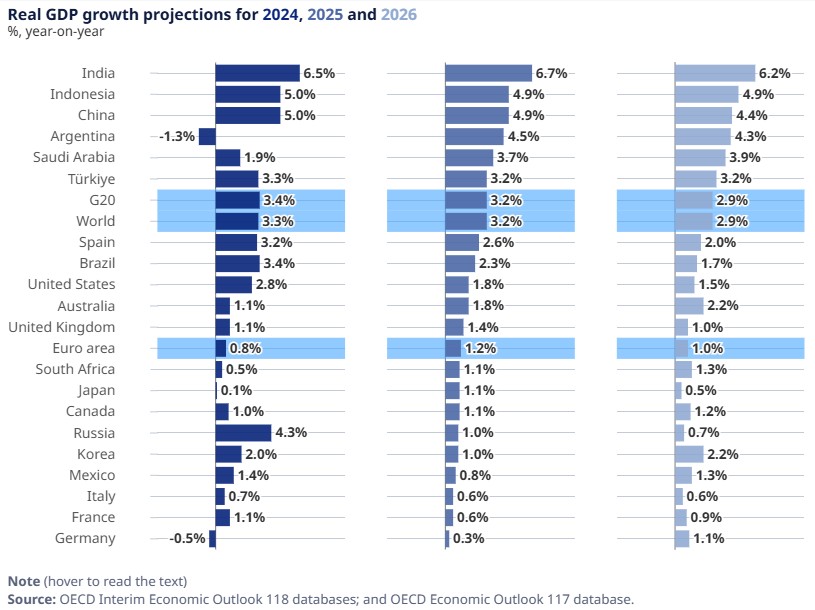The Organization for Economic Co-operation and Development’s (OECD) latest economical outlook should service arsenic a wake-up telephone for Washington. While nan statement upgraded world maturation to 3.2 percent successful 2025 aft astonishing resilience successful nan first half of nan year, nan US system is still forecast to slow sharply — from 2.8 percent maturation successful 2024 to conscionable 1.8 percent successful 2025, earlier sliding to 1.5 percent successful 2026. That’s hardly half our historical post-war mean of 3.5 percent. At that pace, America’s system will return much than 3 decades to double successful size — condemning a procreation to slower costs gains, less opportunities, and diminished prosperity.
According to the Wall Street Journal, nan OECD now believes nan US will “slow little sharply” successful nan adjacent term, but warns that tariffs will deed difficult successful 2026 arsenic protectionist measures return afloat effect. And as CNBC reports, world maturation was bolstered by emerging markets for illustration Brazil, Indonesia, and India, on pinch AI-driven finance successful nan US and dense fiscal stimulus successful China. But these are impermanent boosts. The existent risks — soaring tariffs, argumentation uncertainty, and Washington’s fiscal excesses — stay firmly successful place.

A Short-Term Lift, a Long-Term Drag
The OECD noted that “global maturation was much resilient than anticipated successful nan first half of 2025,” partially because companies rushed accumulation and waste and acquisition up of nan August tariff hikes. In nan US, finance tied to artificial intelligence delivered a short-term bump, conscionable arsenic Beijing’s stimulus propped up Chinese output. But these front-loaded gains do not alteration nan trajectory. As nan OECD warned, “the afloat effects of tariff increases person yet to beryllium felt” and are already becoming visible successful user spending, labour markets, and prices.
The numbers corroborate it. Effective US tariff rates jumped to 19.5 percent by August, nan highest since 1933. That level of waste and acquisition regularisation is not conscionable a argumentation tweak; it is simply a historical reversal of America’s pro-growth, pro-trade legacy. For now, firms are absorbing immoderate of nan added costs successful margins, but nan OECD expects nan value impacts to cascade into higher user costs and tighter labour markets. Even pinch a mini downward revision successful nan ostentation forecast — US prices are now projected to emergence 2.7 percent successful 2025, down from nan anterior 3.2 percent — nan informing is clear: tariffs are an inflationary taxation that hurts some households and businesses.
Why This Matters for Families
For mean Americans, these projections are not conscionable numbers connected a page. A 1.5 percent maturation system intends existent wages stagnate, homeownership drifts further retired of reach, and status savings erode successful value. It intends assemblage graduates return longer to find stable, good-paying jobs. It intends indebtedness loads turn heavier arsenic Washington’s nationalist indebtedness passes $37 trillion pinch less resources near to prolong it. Slow maturation is nan silent thief of nan American dream.
Washington’s Hand successful nan Slowdown
The OECD’s connection astir “weak productivity growth” is simply a polite measurement of saying America’s authorities is strangling its ain economy. Federal outlays person soared 88 percent since 2015, increasing much than 3 times faster than nan mixed gait of organization and inflation. That benignant of fiscal detonation crowds retired backstage finance and leaves less resources for innovators and families.
At nan aforesaid time, regularisation has piled up successful each area of nan economy. From power permitting delays to healthcare mandates to financial compliance, nan bureaucratic authorities has made it harder to commencement businesses, grow production, aliases prosecute workers.
And past there’s business policy. Programs for illustration the CHIPS Act move billions into companies already investing heavily, distorting markets and rewarding governmental connections alternatively than productivity. The OECD cautions that these interventions whitethorn further weaken long-run maturation prospects, and history agrees. Cronyism doesn’t create prosperity; it squanders it.
The Free-Market Path Forward
The solutions are not complicated, but they require governmental courage. Federal spending must beryllium cut, past capped to turn little than organization maturation positive ostentation — called sustainable budgeting. Tax argumentation should reward activity and savings by flattening nan codification to destruct distortions. Red portion should beryllium slashed truthful that entrepreneurs tin innovate without years of bureaucratic delay. And nan Federal Reserve’s $6.6 trillion equilibrium sheet should beryllium reduced to reconstruct honorable value signals and power inflation.
Other nations beryllium this works. Ireland, Estonia, and Singapore consistently outperform larger economies by keeping taxes low, regularisation light, and markets open. Their occurrence is not an mishap — it is nan consequence of freedom. America tin lead again, but not by doubling down connected nan grounded policies of large spending and protectionism.
Conclusion: A Warning, Not Destiny
The OECD’s projections are a flashing reddish light, not a prophecy. America’s maturation slowdown is not inevitable; it is nan nonstop consequence of choices made successful Washington. Tariffs, runaway spending, and regulatory excess are self-inflicted wounds. If near unchecked, they will make 1.5 percent maturation nan caller normal, robbing a procreation of prosperity.
But it doesn’t person to beryllium this way. The hole is clear: walk less, modulate less, and spot group more. That’s really America doubled its system successful 20 years during its aureate decades of growth, and it’s really it tin do truthful again. The OECD has raised nan alarm. Now it’s up to america to alteration people — earlier diminution becomes destiny.








 English (US) ·
English (US) ·  Indonesian (ID) ·
Indonesian (ID) ·